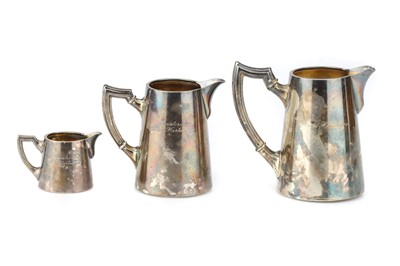24th May, 2023 12:00
Fine Instruments of Science, Medicine and Books
Collection of Silver Plate Jugs Belonging to Dr. Erhard Hartung von Hartungen
German, silver plate art deco jugs each marked to the underside ART KRUPP BERNDORF with capacity 37cl, 25cl and 5cl and each engraved Sanatorium Dr. von Hartungen
Erhard Hartung von Hartungen was a German physician and psychiatrist who is best known for his work in establishing the Hartungen Sanatorium, a renowned mental health facility located in Bavaria, Germany.
Born in 1853 in Berlin, Germany, Hartungen studied medicine at the University of Berlin and later at the University of Munich. After completing his medical training, he worked as an assistant physician at the Berlin Charité hospital before moving to Bavaria to set up his own medical practice.
In 1889, Hartungen established the Hartungen Sanatorium in the town of Bad Steben, Bavaria. The sanatorium was one of the first of its kind in Germany and quickly gained a reputation as a leading center for the treatment of mental illnesses.
Hartungen was known for his innovative approaches to treating mental illness. He was a proponent of psychoanalysis and believed that understanding the patient's unconscious thoughts and emotions was essential to effective treatment. He also believed in the importance of creating a supportive and compassionate environment for patients, where they could feel safe and comfortable as they worked through their mental health challenges.
Under Hartungen's leadership, the Hartungen Sanatorium became a model for other mental health facilities in Germany and beyond. The sanatorium was known for its advanced treatments, including psychoanalysis, hypnosis, and electroconvulsive therapy, which were considered cutting-edge at the time.
Despite the sanatorium's success, it faced challenges during World War II. In 1939, the German government requisitioned the sanatorium for use as a military hospital. Hartungen was forced to flee to Switzerland, where he continued to practice medicine.
After the war, Hartungen returned to Germany and reopened the Hartungen Sanatorium. However, he faced financial difficulties, and the sanatorium eventually closed in 1952. Hartungen died in 1956, leaving behind a legacy as a pioneer in the field of psychiatry.
Today, the Hartungen Sanatorium is recognized as an important landmark in the history of mental health care. It was a trailblazer in the use of psychoanalysis and other innovative therapies, and it set the standard for compassionate and effective treatment of mental illness.
In conclusion, Erhard Hartung von Hartungen was a visionary physician and psychiatrist who made significant contributions to the field of mental health care. His work in establishing the Hartungen Sanatorium helped to advance the understanding and treatment of mental illness, and his innovative approaches to therapy continue to influence the field today. The Hartungen Sanatorium remains a testament to Hartungen's legacy and an important part of the history of mental health care in Germany.
Sold for £375
Result plus buyers premium
German, silver plate art deco jugs each marked to the underside ART KRUPP BERNDORF with capacity 37cl, 25cl and 5cl and each engraved Sanatorium Dr. von Hartungen
Erhard Hartung von Hartungen was a German physician and psychiatrist who is best known for his work in establishing the Hartungen Sanatorium, a renowned mental health facility located in Bavaria, Germany.
Born in 1853 in Berlin, Germany, Hartungen studied medicine at the University of Berlin and later at the University of Munich. After completing his medical training, he worked as an assistant physician at the Berlin Charité hospital before moving to Bavaria to set up his own medical practice.
In 1889, Hartungen established the Hartungen Sanatorium in the town of Bad Steben, Bavaria. The sanatorium was one of the first of its kind in Germany and quickly gained a reputation as a leading center for the treatment of mental illnesses.
Hartungen was known for his innovative approaches to treating mental illness. He was a proponent of psychoanalysis and believed that understanding the patient's unconscious thoughts and emotions was essential to effective treatment. He also believed in the importance of creating a supportive and compassionate environment for patients, where they could feel safe and comfortable as they worked through their mental health challenges.
Under Hartungen's leadership, the Hartungen Sanatorium became a model for other mental health facilities in Germany and beyond. The sanatorium was known for its advanced treatments, including psychoanalysis, hypnosis, and electroconvulsive therapy, which were considered cutting-edge at the time.
Despite the sanatorium's success, it faced challenges during World War II. In 1939, the German government requisitioned the sanatorium for use as a military hospital. Hartungen was forced to flee to Switzerland, where he continued to practice medicine.
After the war, Hartungen returned to Germany and reopened the Hartungen Sanatorium. However, he faced financial difficulties, and the sanatorium eventually closed in 1952. Hartungen died in 1956, leaving behind a legacy as a pioneer in the field of psychiatry.
Today, the Hartungen Sanatorium is recognized as an important landmark in the history of mental health care. It was a trailblazer in the use of psychoanalysis and other innovative therapies, and it set the standard for compassionate and effective treatment of mental illness.
In conclusion, Erhard Hartung von Hartungen was a visionary physician and psychiatrist who made significant contributions to the field of mental health care. His work in establishing the Hartungen Sanatorium helped to advance the understanding and treatment of mental illness, and his innovative approaches to therapy continue to influence the field today. The Hartungen Sanatorium remains a testament to Hartungen's legacy and an important part of the history of mental health care in Germany.









